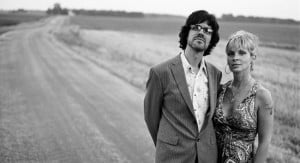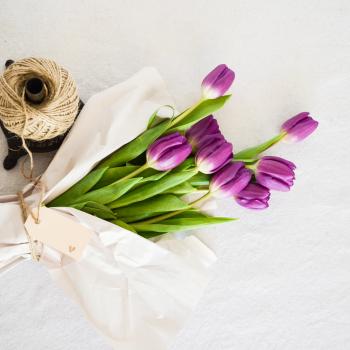Guest Post
Today I continue yesterday’s conversation with Linford Detweiler about place, songwriting, the sacred, and what’s next for him, his wife Karin, and their band Over the Rhine.
Meredith Holladay: What’s the hardest part about making music as a married couple?
Linford Detweiler: Probably just the incessant nature of sharing a common dream, being an entrepreneurial couple: Your gig never really goes away completely. You carry it with you always. But I should counter by saying that it hasn’t always been a difficult road either. Karin and I had a musical chemistry that was apparent and immediate. That was, and remains, a gift.
But yes, taking care of the gifts we are given sooner or later requires some hard work. We try to tend both gardens: the garden of our relationship, and the garden of our music.
MH: In writing about the song, “Meet Me at the Edge of the World,” you say one of the things you felt pulled to do after moving to Nowhere Farm was to learn the names of the plants, trees, and birds on the farm. Can you speak to the importance of naming for you, particularly as the practice is tied to place?
LD: One of the first things we realized when we left the city, [was] we didn’t know the names of much of anything. It felt like an act of respect to slowly begin calling trees, songbirds, and wildflowers by name. It also felt like learning a new poetic language: tupelo, sassafras, staghorn sumac, indigo bunting, house finch, bobwhite, ironweed, dogbane, aster.
And once we started calling things by name, they began appearing in our songs. (And it’s endless: this summer we’ve been trying to name the crazy-beautiful butterflies that float in: zebra swallowtails, etc.)
Karin likes to walk the dogs on a path along the edge of our woods and there is a lone tupelo along the path that turns the most vivid color of red in the fall—a red that can’t be described; it’s so wine and blood-soaked. It’s become a bit of a sacred spot for her and often she receives a signal of some kind when she arrives there—a few words, a melody to hum, a few tears, or something like a prayer. One day most of the words to the song you mentioned poured out.
MH: You often write about spiritual things in your music. What kinds of theological ideas captivate you or keep you up at night?
LD: Well, I think most interesting art bumps up against the big questions sooner or later. Maybe all good art is a yearning toward something that can’t be fully articulated. Both Karin and I were raised in…churches, and we were surrounded as children by gospel music and old hymns. Once those old hymns get into your bones, they are there forever. And I’ve been known to argue that there could have been no Elvis Presley or Johnny Cash without the songs they encountered as children in their mothers’ hymnals.
And I’ve come to believe that there are only three subjects available to the writer: God, love and death. We try to write about all three.
As far as staying up at night: I’m a nightwalker. I wish I were a morning person like Mary Oliver, one of my poet-heroes. There are seasons when I force myself to get up early and down some dark coffee and leave the house to witness the miracle of the birth of any given day, but I can’t sustain that early rising. I was born a night owl, which is partly why I can be a touring musician for a living.
And when I’m out walking beneath the stars, I feel that yearning toward something that can’t be fully articulated. I call that prayer. Jane Siberry once told me, “All songs are prayers.” I’ve been haunted by her idea from time to time.
MH: For musicians and artists who wrestle with matters of faith but don’t find themselves wrapped up in the Christian subculture, there can certainly be a tension between sacred and secular. Can you speak to what experience you have of wrestling with those realms?
LD: We always wanted to take our music to the general marketplace and join the larger conversation of American music. We wanted our songs and records to be worthy of that conversation, and still do. We love the diversity of our audience, and it is all over the map—as it should be.
I think if the writing rings true and has conviction, and if people feel something on their skin when they hear the music, it will speak for itself and find its way where it will. Hopefully anyone can lay the transparency of their lives on a good song and find points of intersection that spark and hum. And I am not interested in making a distinction between secular and sacred. It’s all sacred.
MH: Much of your writing seems haunted by the tension between this life and what comes after. How do you wrestle with this mystery?
LD: Both Karin and I have been called upon to lay loved ones to rest. Some days the veil between the living and those who have crossed over feels so thin. Other days the chasm seems vast and utterly impassable.
When my father died suddenly, it shocked me. I no longer saw my life as something that unfurls indefinitely. Rather, I began to process my life in terms of how much time I had left. This can be freeing and can bring clarity. And it can also at times flood me with a sense of futility. So I wrestle with the angel of my impending death. There are times when it’s an embrace. And there are times when it’s a cat fight with a lot of clawing and pissing.
MH: Much of your music is infused with melancholy—though it might still be a hopeful melancholy. Where do you find hope when you look around the world?
LD: We feel the rhythm of the changing seasons more deeply on the farm, and there is something comforting about that cycle of birth, life, death, and resurrection that plays out at its own pace year after year. Gazing upon the things of God gives me hope. I look at the sky a lot, and the trees on our land, and the weeds and wildflowers too. Planting a garden is a hopeful thing.
Young people give me hope. I’m pretty sure many of them are going to be smarter than our generation. I hope so.
Rev. Dr. Meredith Holladay is a proud Louisvillian (Go Cards!) transplanted to Kansas by way of both New Jersey and Texas. She serves as Associate Pastor of Spiritual Formation at First Baptist Church, Lawrence, Kansas. She spent her Texas years studying religion and society at Baylor University, where she wrote a dissertation on theology and popular music, focusing on the music and work of Over the Rhine and the Indigo Girls.











